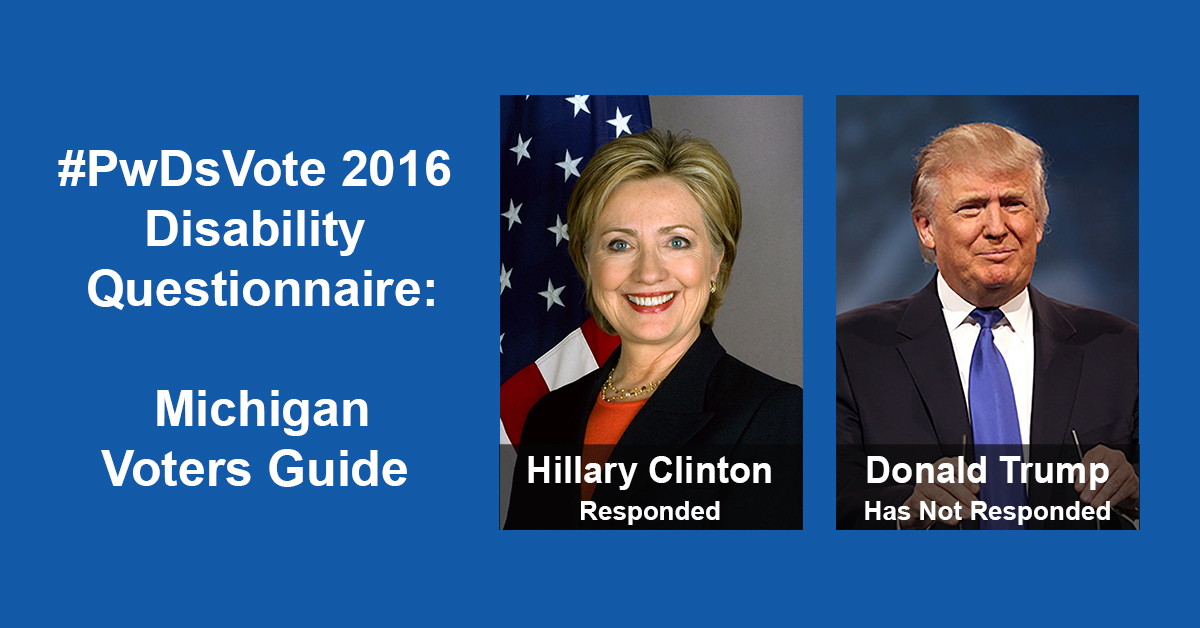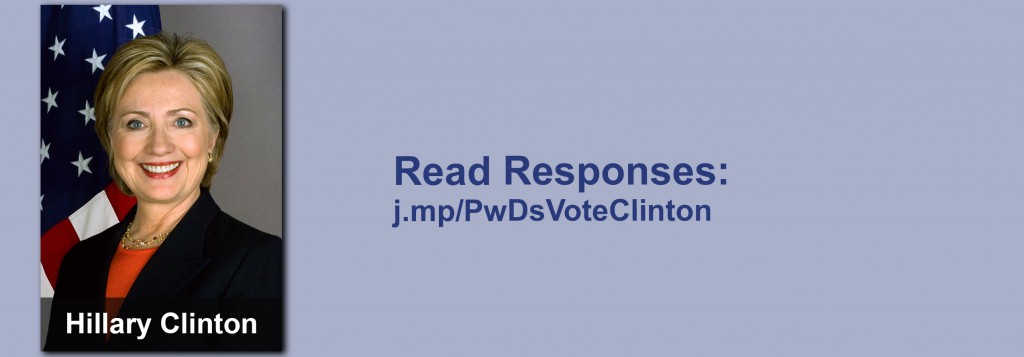Washington, Oct. 14 – As voters get ready to head to the polls in Michigan, RespectAbility is releasing its Michigan Disability Voter Guide for the upcoming presidential election. Democrat Hillary Clinton has completed the #PwDsVote Disability Campaign Questionnaire, but Republican Donald Trump has yet to do so.
The #PwDsVote 2016 Campaign Questionnaire was designed by and for people with disabilities (PwDs) and those who love them to know where candidates stand on key issues. RespectAbility is nonpartisan and does not endorse candidates. The questionnaire is purely for educational purposes as voters go to the polls.
According to a new report from Rutgers University, 35.4 million people with disabilities will be eligible to vote in the November 2016 elections, representing close to one-sixth of the total electorate. That’s an increase of nearly 11 percent since 2008.
The presidential questionnaire was created during the primary season and asked all of the presidential candidates to comment on 16 disability questions. Former Secretary of State Hillary Clinton responded by addressing all of the questions. Despite numerous requests in person and by phone and email, the Trump campaign has not yet filled out the questionnaire. The American Association of People with Disabilities and the National Council on Independent Living also has a nonpartisan presidential questionnaire, which both Clinton and Trump have completed. Libertarian Gary Johnson and Green Party candidate Jill Stein have not filled out either questionnaire.
Twenty-three candidates for Senate, as well as nine candidates for governor, from both sides of the aisle (19 Democrats, 13 Republicans) also completed the down ballot questionnaire, showing that disability rights is a nonpartisan issue. The responses also are geographically-diverse, coming from states all around the country, as politicians are paying more and more attention to the disability community.
Michigan Needs to Improve Outcomes for Citizens with Disabilities
According to Census data from 2013, Michigan ranks 44th in the country in terms of their employment rate of people with disabilities. Only 29.9 percent of the 684,000 working-age Michiganders with disabilities are employed. Further, there are more than 48,500 youth with disabilities and each year a quarter of them will age out of school into an uncertain future. A good example of the uncertainties facing Michigan’s disability community is the issue of not pulling down the full federal match of funding for VR. In 2014, Michigan Rehabilitation Services had to return $19 million dollars to Washington, D.C., because the state budget failed to come up with adequate matching funds.
Despite poor performance metrics in the past, Michigan has many of the ingredients essential to future success. The state plan includes critical data points, discusses outreach to key businesses, and points to growing sectors to set Michigan on a path to expand job opportunities for people with disabilities. These efforts, combined with the strategic opportunities offered by the Workforce Innovation and Opportunity Act (WIOA), mean that Michigan can invest heavily into improving the competitive, integrated employment outcomes for its citizens with disabilities. But, there remains a staggering 45-percentage point gap in the labor force participation rates (LFPR) between people with and without disabilities in Michigan. This gap will not be closed unless resources are committed to best practices and cost-effective models.
Michigan’s voters are looking to know where the candidates stand on important disability issues in order to increase opportunities for competitive, integrated employment for people with disabilities and foster a more inclusive society. As such, RespectAbility has actively encouraged politicians to include people with disabilities in their policy agendas. Founded in 2013, RespectAbility is a nonpartisan, nonprofit organization working to end stigmas and advance opportunities for people with disabilities.
America has 1.2 million youth with disabilities between the ages of 16 and 20. Each year 300,000 of them age into what should be the workforce, but stigmas and lack of knowledge about the capabilities of people with disabilities means that most do not find employers willing to hire them. Young adults with disabilities in all of these states are hoping to find work. They have high expectations and deserve the opportunity to achieve the American dream. Young people with disabilities may simply need some thoughtful help to transition into the workforce. See data on all 50 states here: State Data.
Fully one-out-of-five Americans have a disability, and 52 percent of likely voters have a loved one with a disability. Only 34 percent of working-age Americans with disabilities have jobs, despite the fact that the vast majority want to work. More than 11 million working age people with disabilities are now living on government benefits in our country.
RespectAbility President Jennifer Laszlo Mizrahi said, “Our community is looking for jobs so we can achieve the American dream, just like anyone else. It is vital for us to know where the candidates stand on economic, stigma, education, safety, transportation, housing, healthcare, foreign affairs and other issues.”
Remember to Vote
Michigan residents can vote for the candidates of their choice either through the standard voting schedule or through absentee voting. The registration deadline was Oct. 11, 2016. For more information, visit: Michigan Voter Registration. The local clerk can help with questions about voter registration, polling place location and working at the polls. Find local clerks here: Find Your Local Clerk in Michigan.
In Michigan, you may vote absentee if you are: age 60 years old or older; unable to vote without assistance at the polls; expecting to be out of town on election day; in jail awaiting arraignment or trial; unable to attend the polls due to religious reasons; appointed to work as an election inspector in a precinct outside of your precinct of residence. Request an absentee ballot no later than 2:00 p.m. on Nov. 5, 2016. After receiving your absent voter ballot, you have until 8:00 p.m. on Election Day to complete the ballot and return it to the clerk’s office. For more information, visit: Absentee Voting in Michigan.





Be First to Comment